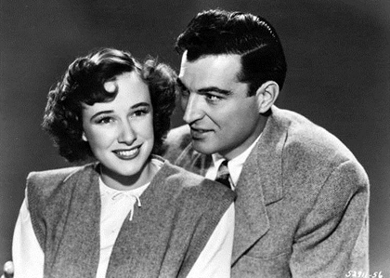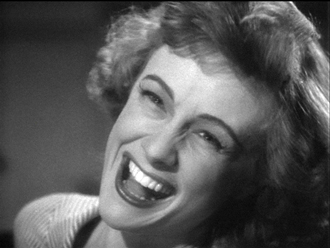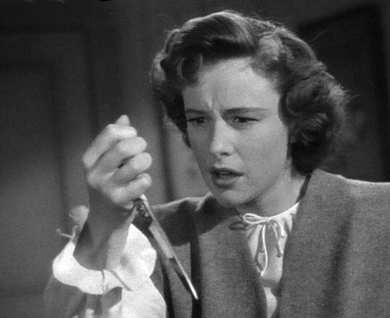
 |
|
|
|
Radio sensation Arch Oboler tried repeatedly to shift his writing and directing talent to the movies, mostly making one-shot novelty pictures, including the feature that launched the '50s 3D craze, Bwana Devil. His first filmic adventure was a direct adaptation of his short story "Alter Ego". Made for MGM in 1945, it's also a B-picture showcase for that studio's Phyllis Thaxter, who a year before had garnered positive attention for her role as Van Johnson's adorable all-American wife in the wartime saga Thirty Seconds over Tokyo. Retitled Bewitched, Oboler's movie is unaccountably passed over in discussions of Hollywood movies about the criminally insane. The very modest production rests on the Mad Killer spectrum somewhere between Dr. Jekyll and Mr.Hyde and Psycho. 
Soon to be married, young ingenue Joan Alris Ellis (Phyllis Thaxter) alarms her fiancé Bob Arnold (Henry H. Daniels, Jr.) and her parents with fears that something is dreadfully wrong with her mind. After fainting at her own engagement party, Joan becomes aware of a voice in her head, an evil second personality named Karen that demands the right to control their "shared" body. The voice promises to go away if Joan leaves town and disappears, so she runs off without explanation to New York, and finds a job at a hotel tobacco counter. There she meets attorney Eric Russell (Horace McNally, before he changed his name to Stephen) and they begin a romance. But Karen returns, more defiant than ever. She seems able to take control of Joan while kissing Stephen, making her behave in a lewd manner. Joan is convinced that she'll never be free. Then Bob shows up to take Joan home. As he helps her pack Karen reasserts herself more strongly than ever, demanding that Joan murder her ex-boyfriend! Arch Oboler wow'ed 'em with his spooky radio anthology show Lights Out, but his Bewitched is less an adaptation for the screen than a deployment of radio techniques to sidestep expensive production values. The movie has point-of-view issues. It is the intimate tale of a girl with a split personality problem, yet is ostensibly all being narrated by her defense psychiatrist Dr. Bergson, played with firm authority by Edmund Gwenn. Yet most of the events leading up to Joan's murder charge involve Joan's private, privileged emotions and reactions. As any movie shows concrete actions occurring on screen, we also see scenes that depict exactly how things happened. Dr. Bergson doesn't believe the things that he 'remembers' with his own eyes. Oboler must have consulted medical experts for he portrays some aspects of multiple personality syndrome fairly correctly. The fault is in how he exploits the problem for his movie. For every sensitive moment there is a sensationalized scene that belongs in a much less refined story context. 
Bewitched begins with the opposition of the Good girl vs. Bad girl syndrome. Joan is understandably terrified of ceding control of her mind and body to the vulgar and brazenly wanton Karen. "Karen's" voice is supplied by Audrey Totter, who was making herself known at MGM as a bad girl in noir pix. Bewitched also has a bit of Val Lewton in it. Joan has basically the same problem that plagues the unlucky Irena in Cat People -- when sexually aroused she becomes a monster. But mostly we're at all times aware that Oboler is working his gimmick, in this case not only the alien voice of Karen but Joan's own anguished speeches. Then there's Dr. Bergson's private thoughts. Even though Oboler accompanies some of these vocal montages with interesting visuals -- like Joan walking in a cloud as prison bars revolve around her -- the movie operates like a radio show. Even with one's eyes closed, every nuance of the story in the dialogue script. The film is perhaps less aligned with Stevenson's Dr. Jekyll than it is de Maupassant's The Horla, a tale of demonic possession by a disembodied voice. The wicked Karen siezes control of Joan in moments of emotion or passion, excited by the prospect of wild passion and mad crimes. Here's where Phyllis Thaxter gets to show her stuff. The outwardly respectable Joan falls for the handsome, gentle Eric. When Joan "becomes" Karen, the camera tilts and she assumes the appearance of a wild-eyed, vengeful demon. This works for the film but against Ms. Thaxter... the attempt to show off her versatility fails because Karen is such a one-note harpy. As there's little complexity to the possession gimmick -- nobody acknowledges that Karen is simply Joan's "Monster from the Id," Thaxter's good acting doesn't build on her image as a pixie-eyed wholesome girl-back-home type. In the final act Oboler stresses the psychiatry angle, which results in a silly dramatic situation that can only be described as a scientific Exorcism. Joan is due to be executed for murder, but Dr. Bergson has brought her before the governor to prove his hypothesis about split personalities. Bergson hypnotizes Joan, and makes contact with Karen as well. "Ghost" images of the Good and the Bad versions of the girl materialize beside the seated, hypnotized figure, almost like comic angel and devil figures. All Dr. Bergson need do is tell the bad girl Karen that her strength is waning, and to hit the road. Even more comically, although Bergson has demonstrated nothing concrete, the governor and the warden are sold on the idea that she's now cured and needn't be sent to the electric chair. We're thinking that Joan's "cure" could easily be part of a con game. The man Joan killed is still just as dead, and her confession just as real -- how could the governor simply pardon her? The psychiatric hokum in old movies (and many new ones) has less than nothing to do with reality. 
Bewitched was considered an interesting thriller but it didn't boost anybody's career. Arch Oboler would continue to tinker with movie gimmicks; his pictures had clever ideas but critics didn't have kind words for his skill with actors. Phyllis Thaxter never made the jump to first rank stardom, although she is always good in everything she does. Steven McNally makes a fine emotional impression and of course enjoyed a good run of movie appearances, playing mostly tougher characters. After his familiar stint as Santa Claus Edmund Gwenn was mostly seen as a bumbling, cute codger. Here in 1945, he's great as the unsentimentalized shrink solving a case and saving a life. Gwenn's strong voice and determined manner put across most of the script's nonsense psycho-talk. If anything, it reminds us of the ending scene in Hitchcock's Psycho, which also almost falls on its face. Bewitched has the excuse of being made at a less developed stage of the psycho-thriller subgenre. Seen in that light, it's an accomplished picture. 1 
The Warner Archive Collection DVD-R of Bewitched is in great shape; the film's elements must not have seen much printing use. Audio is strong as well. The original trailer included uses part of the film's stylized trial sequence, that plays like a poor man's version of the expressionist trial in the early noir masterpiece Stranger on the Third Floor. It's too bad for Phyllis Thaxter: if they instead had promoted her in a conventional romance opposite Horace McNally, she might have done much better. Ten years later Joanne Woodward garnered valuable attention for her showcase (show-off) multiple personality picture The Three Faces of Eve, but none of Eve's split personalities was a psycho killer.
On a scale of Excellent, Good, Fair, and Poor,
Bewitched rates:
Footnote:
1. Writer Matthew Rovner tipped Savant off to the WAC's release of Bewitched a couple of months ago. He's been studying Arch Oboler for some time now, and has posted interesting articles on the radio veteran's film work. Arch Oboler's 'Bewitched' and its Alter Egos is Matthew's own review/study of the film. Night of the Auk is a critique of an Oboler TV show from 1960, a science fiction tale starring James MacArthur and William Shatner. Moon mission astronaut Shatner claims the Moon for the United States, and touches off a nuclear war! Online as well is Rovner's original 2009 study of Oboler's career: What Ever Happened to Arch Oboler?
Reviews on the Savant main site have additional credits information and are often updated and annotated with reader input and graphics. Also, don't forget the 2011 Savant Wish List. T'was Ever Thus.
Review Staff | About DVD Talk | Newsletter Subscribe | Join DVD Talk Forum |
| ||||||||||||||||||